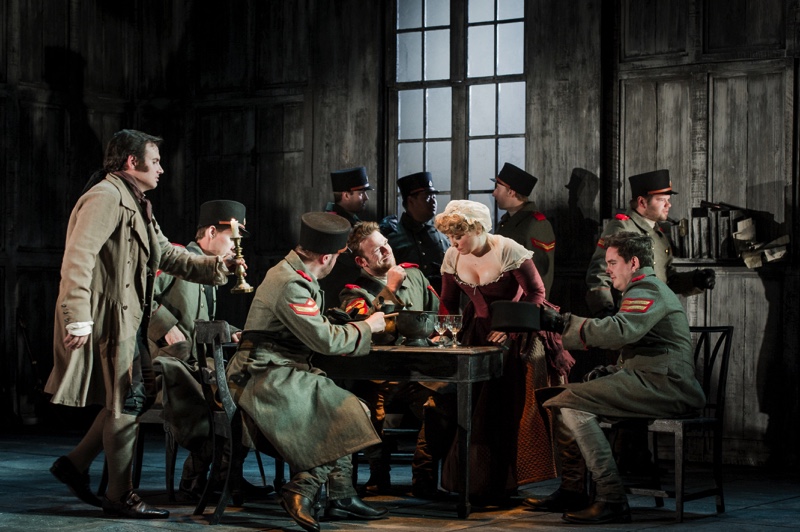Leonore, Buxton Opera Festival, July 2016
Posted on 9 July 2016As an opera composer the 34-year old Beethoven was not a natural and his 1805 Leonore caused him no little trouble. Its poor reception by an audience composed largely of soldiers in Napoleon’s army, who would mostly not have understood the German Singspiel, did not help and a year later he cut it from three acts to two. Then in 1814 he revised it further to what is usually performed today under the title Fidelio.

Jacquino and Marzelline in attendance, all images BuxtonFestival/ Robert Workman
It was therefore a refreshing change to see the original version which gives a more intimate picture of how Leonore, disguised as Fidelio, fits into the household of Rocco the gaoler, in order to rescue her husband Florestan. The grander scope of freedom from repression that particularly informs the 1814 version is largely absent in Stephen Medcalf’s production, which is framed during the overture and final scene by identifying Florestan with Beethoven himself, composing at the piano. As the first act starts the piano vanishes, with Beethoven caged beneath it, into the same part of the set from which Florestan’s cage later appears.

The caged Florestan
The vocal agony and subsequent joy of this unjustly imprisoned man was well expressed by Danish tenor David Danholt, who was equally convincing in acting the frustrated and partly deaf Beethoven. As his wife Leonore, Kirstin Sharpin sang with beautiful strength and modulation, producing a lovely soliloquy to Hope in Act II, and as Marzelline, daughter of Rocco the gaoler, Kristy Swift was sheer delight in her hopelessly optimistic love for Fidelio. Rocco himself was admirably avuncular in Scott Wilde’s very capable portrayal, combining strong vocal presence with excellent diction, and the trios for Rocco, Fidelio and Marzelline were beautifully sung. This was a strong cast, with Stuart Laing as Rocco’s assistant Jacquino, Hrólfur Sæmundsson rather over-forceful as the corrupt prison governor Don Pizarro, and Jonathan Best showing fine aplomb as the government minister Don Fernando, with the Northern Chamber Orchestra under the baton of Stephen Barlow giving Beethoven’s music urgency and restrained passion.

Leonore finally releases Florestan
The excellent chorus moved well, and I liked the freeze in Act I, broken one by one as the quartet of Marzelline, Fidelio, Jacquino and Rocco takes form. Simple and effective designs by Francis O’Connor use the same set throughout, and Simon Corder’s lighting was nicely judged. The use of the 1805 version works very well indeed, giving Beethoven’s opera in this production a thrill and immediacy that it sometimes lacks.
A fine start to the Buxton Festival, with performances continuing on various dates until July 22 — for details click here.

